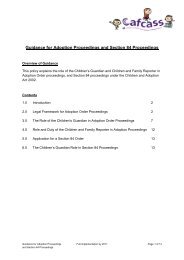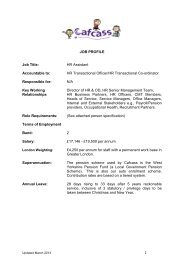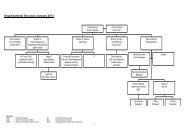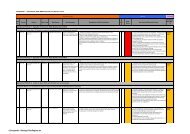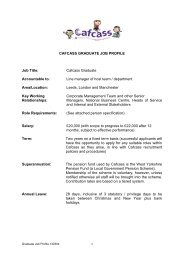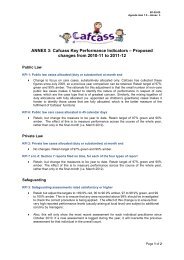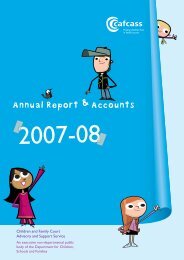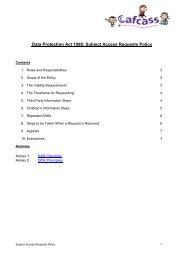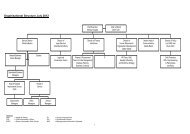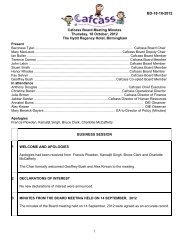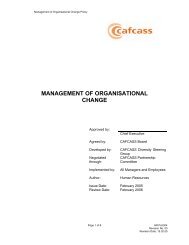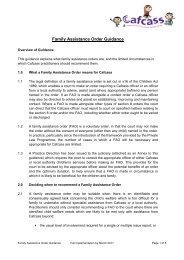open board meeting notes 7 october 2011 macdonald ... - Cafcass
open board meeting notes 7 october 2011 macdonald ... - Cafcass
open board meeting notes 7 october 2011 macdonald ... - Cafcass
You also want an ePaper? Increase the reach of your titles
YUMPU automatically turns print PDFs into web optimized ePapers that Google loves.
OPEN BOARD MEETING NOTES[Type 7 OCTOBER a quote from <strong>2011</strong> the document or thesummary of an interesting point. You can position MACDONALD the text box anywhere RANDOLPH in the document. HOTEL, Use theText Box Tools tab to change the formatting of the pull quote text OXFORD box.]1 WELCOME AND BOARD INTRODUCTIONThe Chair introduced herself and welcomed everyone to the <strong>meeting</strong> saying how good itwas to be in Oxford and to have opportunity to meet all those attending as this waspartnership working at its best. She introduced the <strong>Cafcass</strong> Board members toattendees and, in turn, Board members introduced themselves and provided informationabout their role in <strong>Cafcass</strong>.The Chair informed the <strong>meeting</strong> about imminent changes to the make up of the Boardand about her own term as Chair coming to an end at Christmas after 8 years of service.She said how much she had enjoyed her time as Chair, although it had been verychallenging at the beginning.Before introducing the Chief Executive, the Chair briefly outlined the issues for childrenshe is passionate about, such as children’s rights. She added that she was passionateabout children having transparency in their lives and that it was important that theyshould not be left in limbo. She explained that this had caused <strong>Cafcass</strong> much difficultyas direct work with children has been under great pressure due to rising demand. Shepaid tribute to the members of the Young People’s Board emphasising their contributionto the Board and to <strong>Cafcass</strong>’ direct work with children. She thanked the Board for theirinvaluable support over the years and said what a great privilege it had been to workwith them. She thanked the <strong>Cafcass</strong> staff, saying that they are amongst the best groupsof staff in the social work profession with a real sense of purpose and direction. Shethanked both the Chief Executive and the Executive Team for their leadership. Sheunderlined the importance of retaining the core skills of social workers as we movetowards a Family Justice Service and begin to reflect the work of Eileen Munro. She saidshe was passionate about working in partnership, acknowledging that there had notbeen enough time to do this as we would have wished, and about <strong>Cafcass</strong>, a servicethat gives children their voice at a time of turmoil in their lives and she highlighted theimportance of retaining the best of what <strong>Cafcass</strong> has achieved. She thanked Ofsted fortheir input into improving standards and the Department of Education (DfE) for theircontinued support.2. OVERVIEW OF 2010/11 – ANNUAL REPORTThe Chief Executive thanked the Chair for her words and for her input during the reallydifficult times stating that this had helped the organisation hold its nerve, united by thewish to continuously improve services and outcomes for children even when underpressure. He echoed her thanks to Board members, especially those who would beleaving in the New Year. He paid tribute to staff, thanking them for doing the best jobpossible for some of the most vulnerable children in the country with less time available,due to the rising workload. He emphasised that there are no easy solutions or magicinterventions as each family we work with is unique and, under pressure, and that weneed to focus on reducing delay in public law cases and maximising divergence from thecourts in private law cases.The Chief Executive invited questions from the floorA representative from the Association of Lawyers for Children, asked how the Board was1
managing to join up all the recent interventions and reviews (Family Justice, Munro etc)and the ensuing turmoil and still maintain a service to children and families.The Chief Executive responded that as an arm of the Government, <strong>Cafcass</strong> is dutybound to follow Government policy and is defined by its legislative context and remit. Hesaid that his advice to staff is to get on with the “day job” and not be distracted byconstant change and instability. He said that this turbulence is likely to continue for sometime to come so it is crucial to avoid destabilisation.The Chair of the Child Protection Board (CPB) informed the <strong>meeting</strong> that the role of theCPB was to work with staff and expert advisers to try and manage all the differentstrands of work (Munro, Social Work Reform Board etc) to ensure that professionaladvice is given to staff so that they can give the best service possible to children andyoung people.A representative from the Association of Shared Parenting, stated the he understoodand sympathised with the heavy workload that had been generated post-Baby Peter butfeels that proportionate working has led to a “skimming of issues” with the result being abland Wishes and Feelings letter to the court and in the view of some parents, this wayof working may not be in the best interests of the child.The Chair said she disagreed with the view that proportionate working has led to a“skimming of issues” and said she believed that courts are now being given the realinformation they need. She said that not having to spend time compiling long reports forthe courts saves practitioners’ time which can be more usefully spent with children. Shewent on to say that <strong>Cafcass</strong> allocates a practitioner to a case as soon as possible andthat if the requirements of parents have not been met, they have recourse to an <strong>open</strong>complaints procedure which is currently being reviewed and given extra resources. TheChief Executive added that Wishes and Feelings reports, if done properly, highlight whatchildren are going through and show the world through the child’s eyes. He stated thatwe are engaged in high conflict work but most damage is caused to children by notlistening to what they are experiencing and what they want and need.The of the National Children’s Bureau, asked the Chair which types of partnerships shewould particularly like to build which would make a difference to children. The Chairreplied that <strong>Cafcass</strong> has worked hard to build partnerships in the court context and thatjudges are always key partners. She stated that she and the Chief Executive would liketo reinstate stakeholder <strong>meeting</strong>s and in the meantime in the normal course of its dailywork <strong>Cafcass</strong> is working with a network of 1,000 individual groups which providemediation, PIPs and other contracted and non-contracted services.The <strong>Cafcass</strong> Chief Executive stated that local authorities are key partners and althoughit is not possible to attend all safeguarding groups, <strong>Cafcass</strong> is engaged in some pilots,for example in Coventry, where we are developing an integrated social work analysispre-proceedings which has had some success in diverting cases from court where thereare good local family intervention services available, and in Suffolk where there is apotential post proceedings project. He stated that he would like to see these types ofprojects available throughout the country. He stated that in these difficult times weshould be concentrating on developing multi disciplinary team approaches in order toreduce duplication of effort, time and resource.A representative of National Family Mediation, raised concerns about mediationbecoming devalued. The Chair agreed that there is a lack of clarity and understandingwithin Government about this area of work with the belief that all cases could go to2
mediation instead of to the courts. She stated that a more rigorous understanding isrequired of what mediation is (including an acknowledgement of the need for a menu ofmediation options to be available). The Chief Executive informed the <strong>meeting</strong> that theGovernment intends that <strong>Cafcass</strong> will be a discrete core social work service to the courtswithin the new Family Justice System and as such our important partnership withmediation services will continue.3. REVIEW OF THE YEAR AND CURRENT ISSUES THIS YEARPRESENTATION BY THE CHIEF EXECUITVEThe Chief Executive informed the <strong>meeting</strong> that:<strong>Cafcass</strong> is doing well in terms of <strong>meeting</strong> its (Key Performance Indicators KPIs) – thestandards against which the organisation is formally judged by Parliament;private law demand had reduced during the year but there has been a slightincrease in complexity of cases. He added that not many cases can be diverted fromthe courts due to risk or conflict, as significant input is needed into these. Heinformed the <strong>meeting</strong> that the number of public law care cases continues to risedramatically with all but one month in this year being the highest ever recorded in thehistory of <strong>Cafcass</strong>;demand is rising and as systems such as sufficient permanency options for childrenare not geared up to meet this, the number of children in unresolved situations isincreasing;our budget is balancing and the next few years will be challenging due to a staticbudget and a rise in demand, hence the need for further changes in workingpractices;the Government will be responding to the Family Justice Review in mid Decemberand it is anticipated that the first stage of the review will be for agencies in thesystem to work more effectively together with the new Family Justice Service beingdeveloped over time;all Ofsted inspections apart from one gave ratings of satisfactory or above. The ChiefExecutive thanked Ofsted for helping <strong>Cafcass</strong> improve its practice standards.4. The Chief Executive introduced the Head of Service for C2 who gave the followingpresentation.CAFCASS’ WORK IN OXFORDSHIREPRESENTATION BY HEAD OF SERVICE, C2The Head of Service for C2 gave an overview of the work of C2 which covers MiltonKeynes, Reading and Oxford. He mentioned that <strong>Cafcass</strong> had worked with 5,000children in the area in the last year and gave a breakdown of their ages. He informed the<strong>meeting</strong> that the area was serviced by 12 courts and 3 <strong>Cafcass</strong> offices with 49practitioners overall.He informed the <strong>meeting</strong> that the running costs for the area are £2.7M and that thepriorities for <strong>2011</strong>/12 are to provide safe services, to retain good systems for allocating3
cases, to improve quality of staff and workforce effectiveness (via 6 weekly supervision)and to improve collaborative practice by dealing with complaints in a timely way,capturing compliments and gathering feedback from young people.He stated that there had been a general downward trend this year of around 20% inpublic law care applications but August had seen an upward spike and September looksto be the same. Private law applications had also been on a downward trend but in thelast two months demand had risen and these were more complex cases (rule 16.4)where a guardian needed to be appointed.He gave an overview of the “story so far” for <strong>2011</strong>/12 stating that <strong>Cafcass</strong> had workedwith over 3,000 children with 1,200 in <strong>open</strong> cases. He informed the <strong>meeting</strong> that inAugust there were only two unallocated cases in the area which minimises delay forchildren. Complaints received were about timing of communication, continuity of workerand concentrating on the needs of children – the latter is what we should be doing!In conclusion he gave the <strong>meeting</strong> time to read the compliments on the feedback slideand introduced the Service Manager for S2 who has set up and is running the EarlyIntervention Service which provides work to first hearing in private law cases.THAMES VALLEY INTERVENTION SERVICE (PRIVATE LAW)PRESENTATION BY SERVICE MANAGER, S2A Service Manager for S2 gave a brief overview of the work of the Early InterventionService and how it makes a difference to children. She explained that the Central IntakeTeam in Coventry receives C100 applications from all over the country, screens themand carries out police and local authority checks. She informed the <strong>meeting</strong> thatbetween 30 and 35 cases are transferred to Thames Valley Early Intervention Team(EIT) each week. She explained that as there is only a limited amount of time betweenthe cases being transferred to the EIT and the date of the first hearing, the work of theEIT is vital in terms of bringing together all the information possible about the child sothat it can be presented to the court in a safe and timely manner.CAFCASS’ WORK IN OXFORDPRESENTATION BY SERVICE MANAGER, S2Another Service Manager from S2 gave an overview of the situation in Oxford. Sheinformed the <strong>meeting</strong> that <strong>Cafcass</strong> has a good relationship with the judiciary and workswell with HMCTS, local solicitors, Thames Valley Police and the local authority. Sheadded that a local performance group had been set up in the area and all stakeholdersare dedicated to making sure that delays are avoided. She stated that <strong>Cafcass</strong> sits onOxford’s Local Safeguarding Children’s Board (LSCB) and assists with Serious CaseReviews as necessary. She informed the <strong>meeting</strong> that guest speakers from Women’sAid, Families Need Fathers and the traveller community had been invited to talk topractitioners, helping them to work in a more informed way with every part of the localcommunity. She told the <strong>meeting</strong> about the ways in which children’s feedback is beingsought.4
The Chair thanked the Head of Service and the two Service Managers for theirinformative presentations. She invited questions from the floor.A Unison representative, stated that one of the common complaints from parents inpublic law cases is that there is a change of practitioner in some cases. He asked theHead of Service (S2) what the highest number of practitioners allocated to one casehad been in the Thames Valley area.The Head of Service (S2) responded by saying that whilst he did not have the actualfigures there would never be more than two practitioners allocated to a single case. Hestated that a change to practitioner would only be made in unfortunate or exceptionalcircumstances such as staff sickness or in the situation where a member of agency staffis replaced by a new permanent member of staff and it was never a decision madelightly.A representative from Women’s Aid, asked how <strong>Cafcass</strong> plans to improve theimplementation of its domestic violence procedures and training to ensure consistencyacross the country. She stated that there had been some “drift” over the last year bothnationally and locally. She added that there is very little support available in many areasfor children caught up in domestic violence situations.The Chair answered that one of the problems with having a large, devolved service iscompliance with procedure as there will always be the issue of difference in staff qualityand knowledge base.The Chair of the <strong>Cafcass</strong> Child Protection Board and lead on Safeguarding, said thatwork had recently been done to improve our Domestic Violence Framework and tocement it into our procedures and that practitioners are now able to undertake a properassessment in the event of DV issues arising in a case. She added that <strong>Cafcass</strong>’ linkswith Co-ordinated Action Against Domestic Abuse (CAADA) have been reinstated.A Unison representative, stated that due to external reviews such as the Family JusticeReview, internal pressure to continually improve and the likelihood of more change withthe introduction of the new Operating Manual, staff morale is low. He asked when thingsare likely to settle down so that staff can stop worrying about the future.The Chair stated that constant change is here to stay and that the Chief Executive isdoing all he can to try to mitigate the effects of any negative change. She stated thateveryone was anxious about the future and wanted the best for the service but thesolution is not in our hands. She said that good supervision was the key to help staff geton with the job they love in these uncertain times.5. The Chair closed the <strong>meeting</strong> by thanking everyone for participating so <strong>open</strong>ly thediscussions.5



